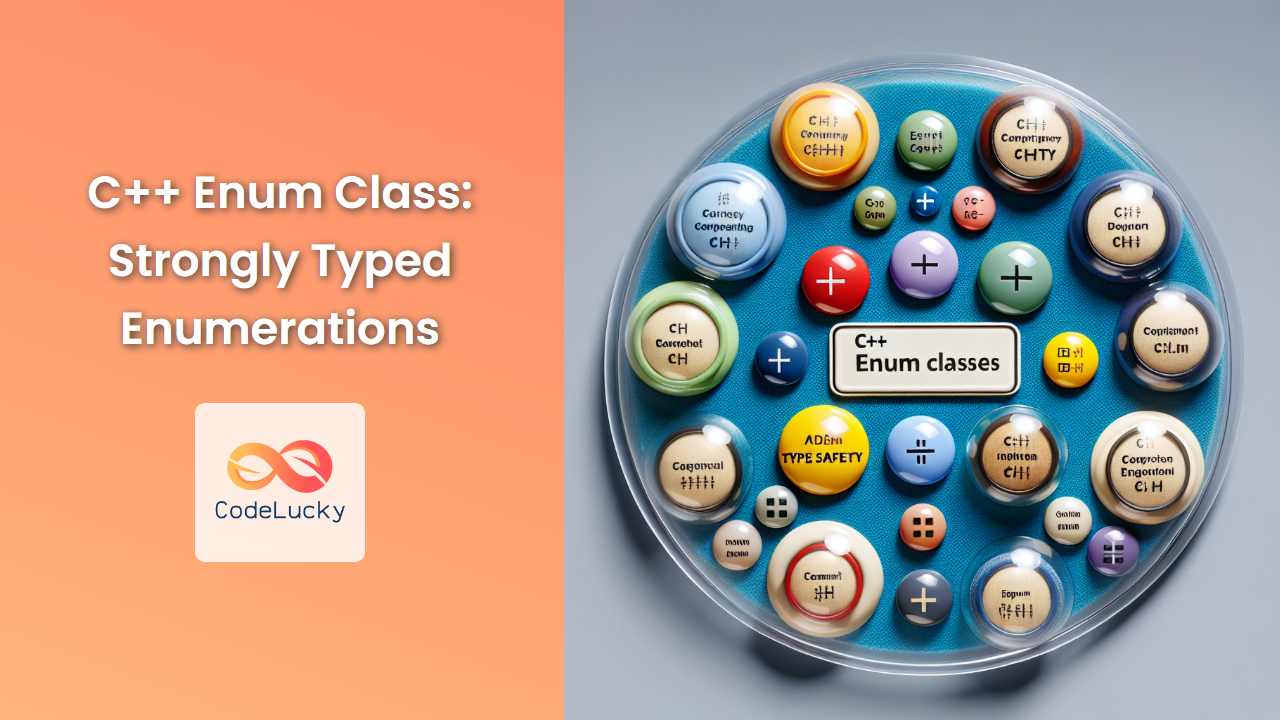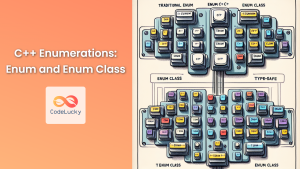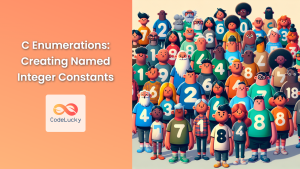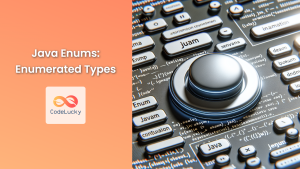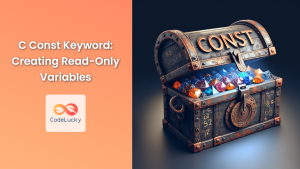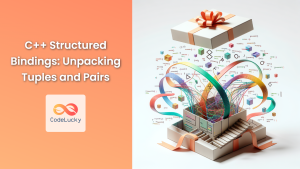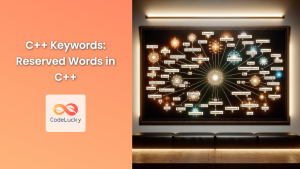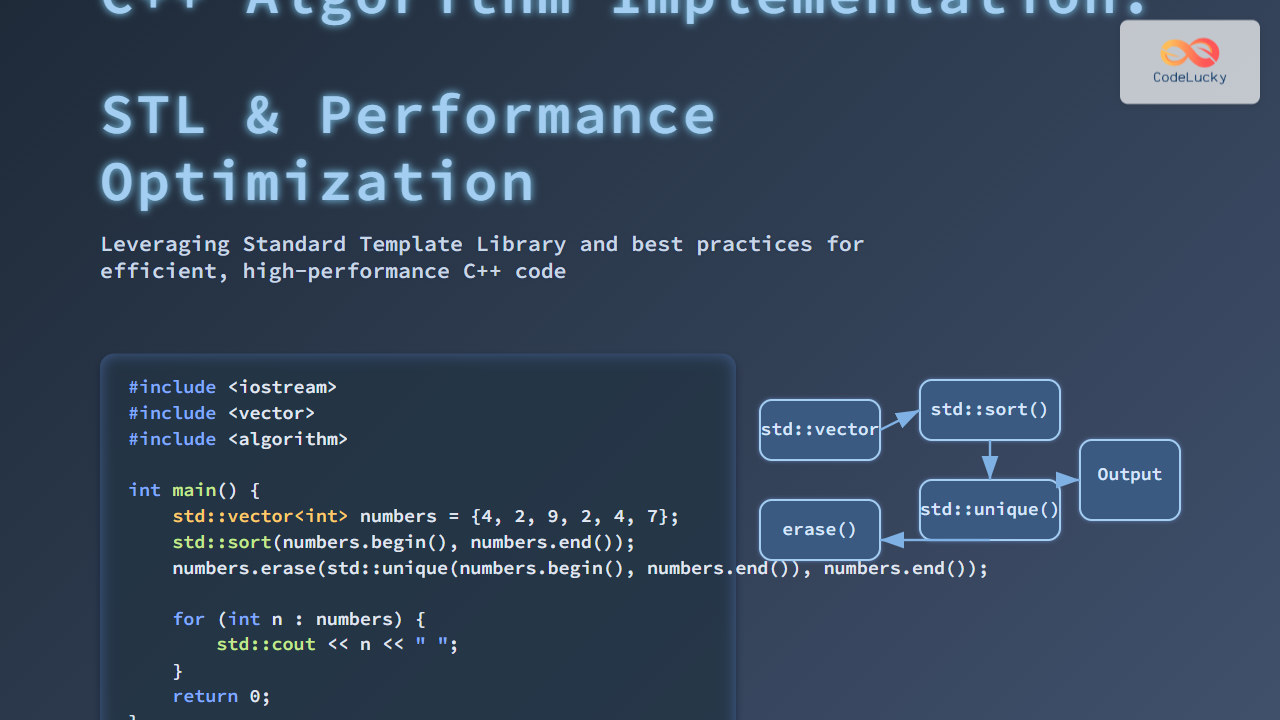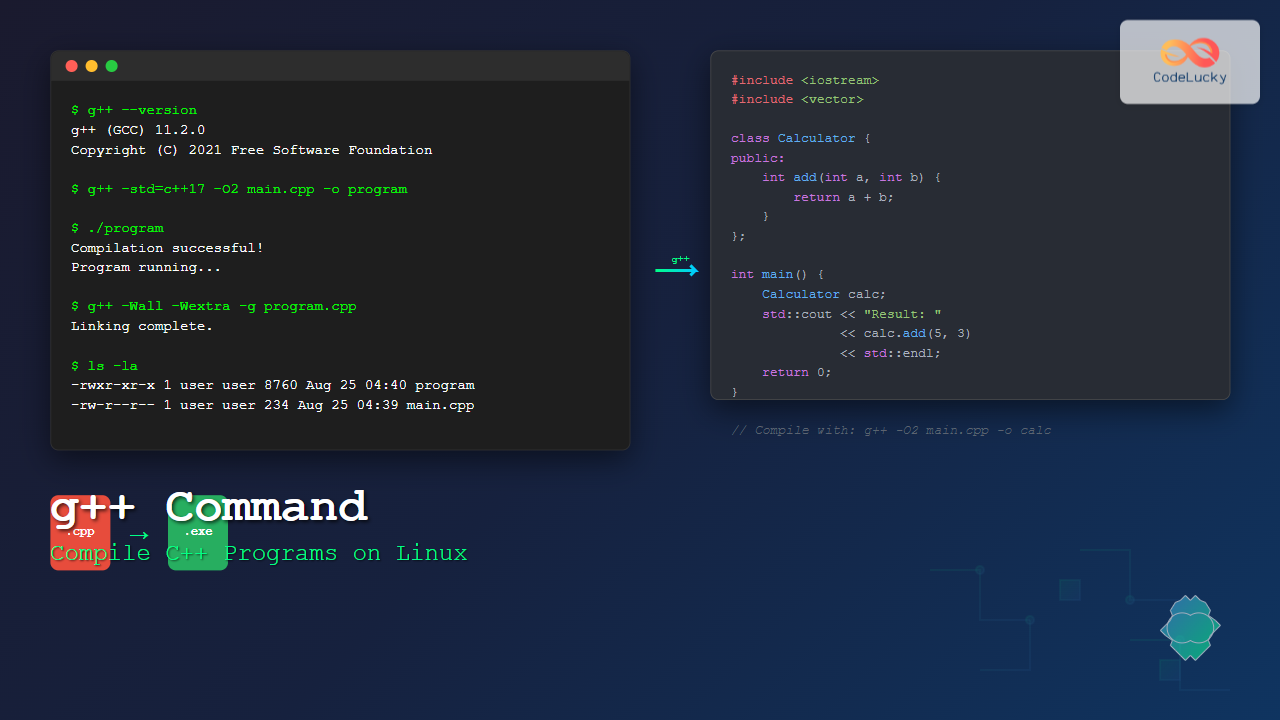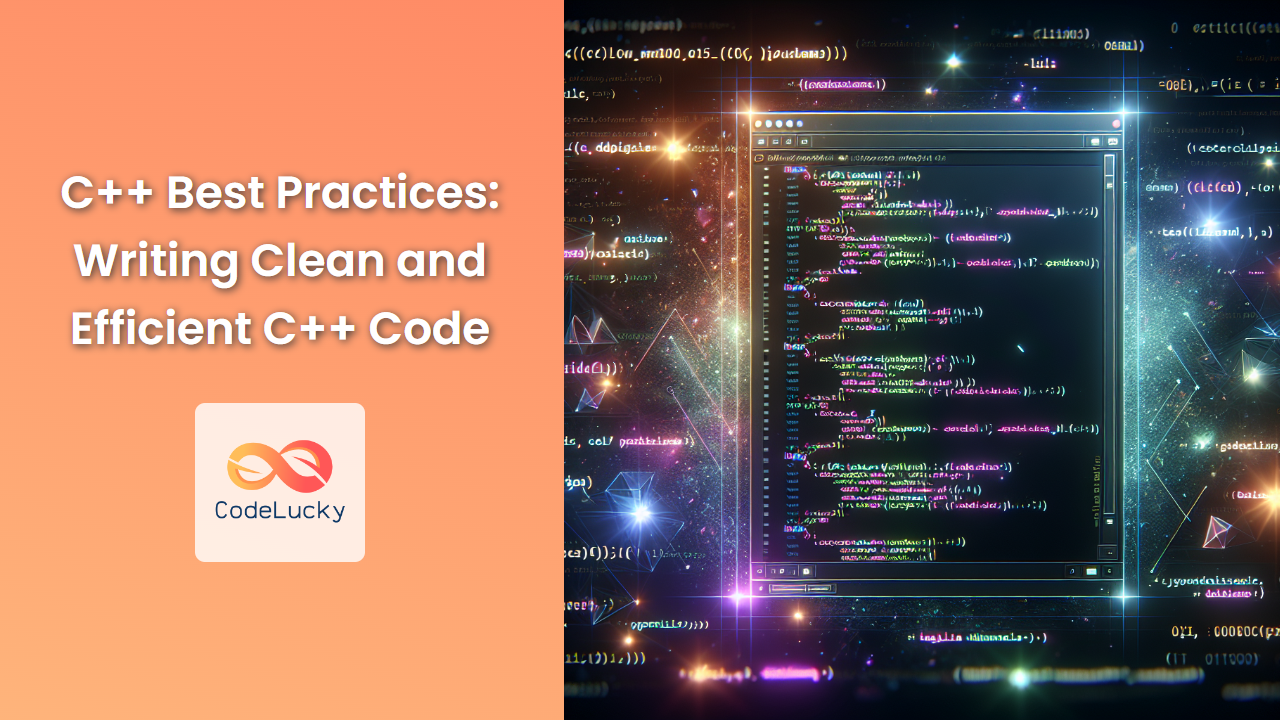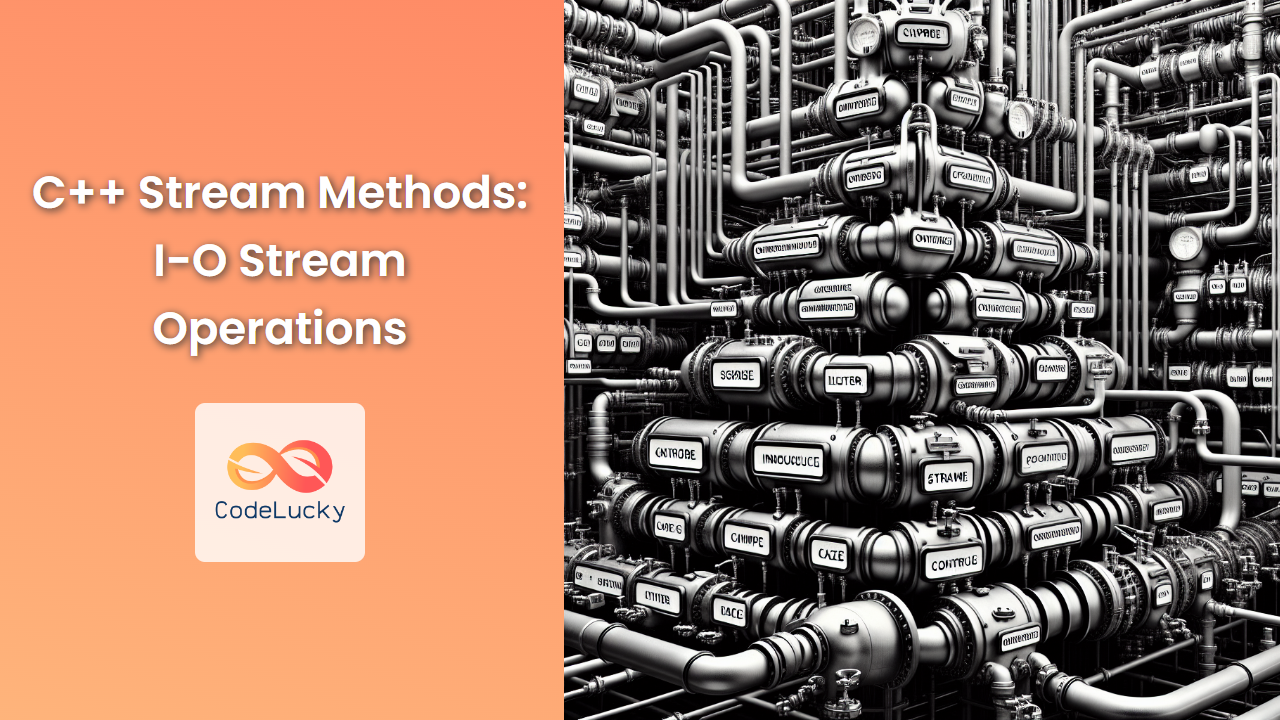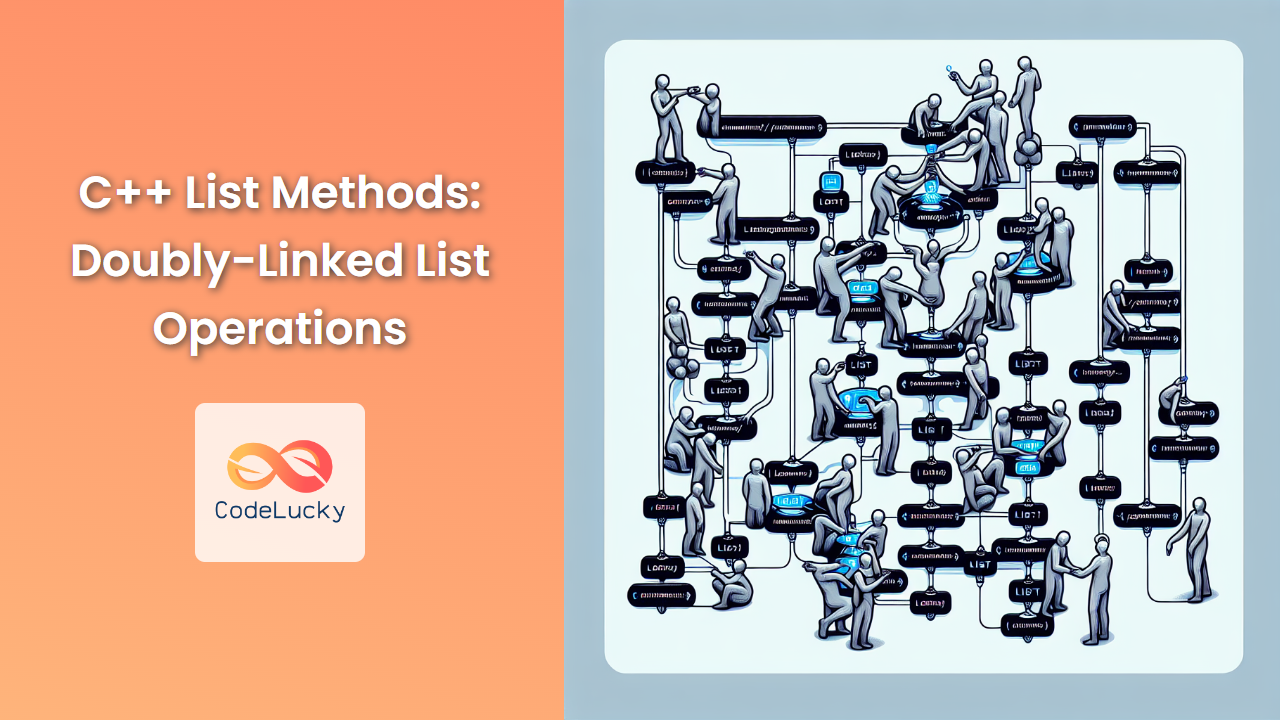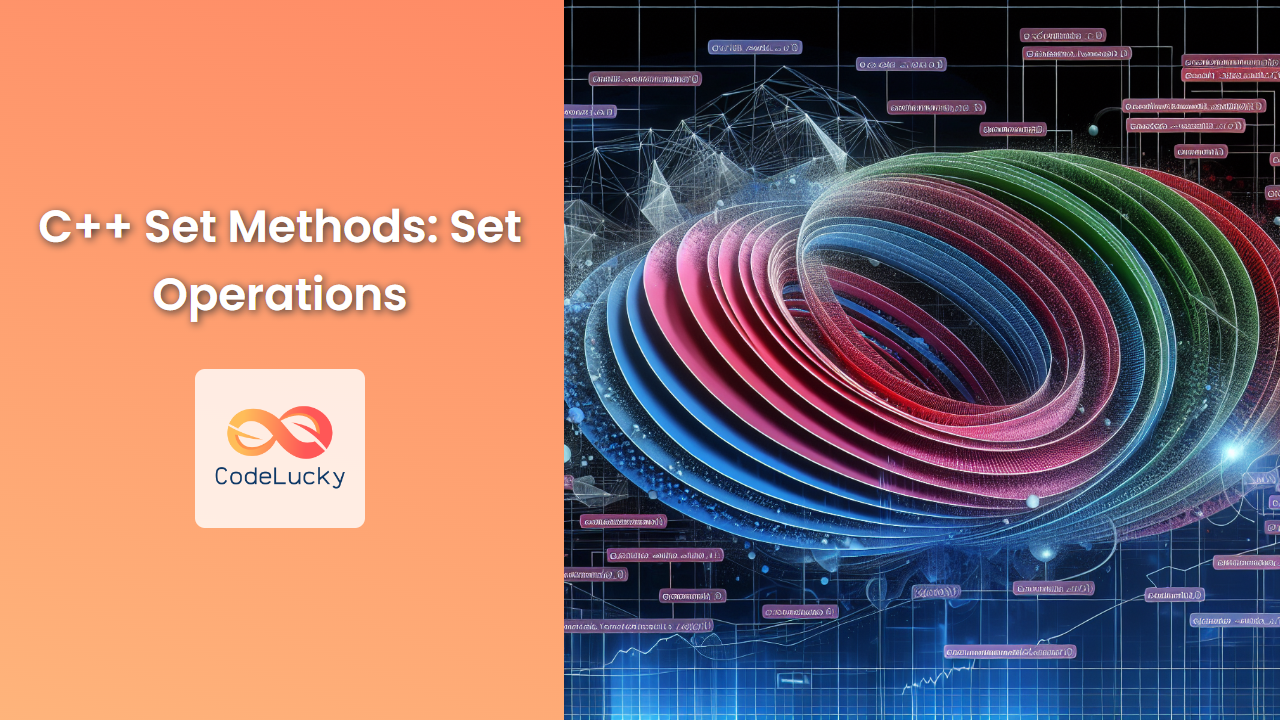C++ has long provided enumerations as a way to define a set of named constants. However, traditional enums have some limitations and potential pitfalls. Enter the enum class, introduced in C++11, which offers a more robust and type-safe approach to enumerations. In this comprehensive guide, we'll explore the power and flexibility of enum classes in C++, demonstrating how they can enhance your code's clarity, safety, and maintainability.
Understanding Traditional Enums
Before we dive into enum classes, let's briefly revisit traditional enums to understand why the need for a stronger enumeration type arose.
enum Color {
RED,
GREEN,
BLUE
};
Color c = RED;
int i = RED; // Implicitly converts to int
Traditional enums have several drawbacks:
- 🚩 Lack of type safety
- 🌍 Global scope pollution
- 🔢 Implicit conversion to integers
These issues can lead to subtle bugs and reduce code clarity. Enum classes address these problems head-on.
Introducing Enum Classes
Enum classes, also known as scoped enumerations, provide a more robust and type-safe alternative to traditional enums. Let's look at a basic example:
enum class Fruit {
APPLE,
BANANA,
ORANGE
};
Fruit f = Fruit::APPLE; // Correct
// int i = Fruit::APPLE; // Error: no implicit conversion to int
Key features of enum classes:
- 🛡️ Strong type safety
- 🔒 Scoped enumerators
- 🚫 No implicit conversions
Advantages of Enum Classes
1. Type Safety
Enum classes enforce strict type checking, preventing accidental comparisons or assignments with other types.
enum class Animal { DOG, CAT, BIRD };
enum class Vehicle { CAR, BIKE, BOAT };
Animal a = Animal::DOG;
Vehicle v = Vehicle::CAR;
// if (a == v) {} // Error: cannot compare Animal and Vehicle
// if (a == 0) {} // Error: cannot compare Animal and int
This type safety helps catch potential errors at compile-time, making your code more robust and less prone to runtime errors.
2. Scoped Enumerators
Enum class enumerators are scoped within the enumeration name, preventing name clashes and improving code organization.
enum class Color { RED, GREEN, BLUE };
enum class TrafficLight { RED, YELLOW, GREEN };
Color c = Color::RED;
TrafficLight t = TrafficLight::RED;
// No name clash between Color::RED and TrafficLight::RED
This scoping allows you to use descriptive names without worrying about conflicts with other parts of your codebase.
3. No Implicit Conversions
Enum classes don't implicitly convert to integers, reducing the risk of unintended behavior.
enum class Day { MONDAY, TUESDAY, WEDNESDAY };
Day d = Day::MONDAY;
// int i = d; // Error: no implicit conversion to int
int i = static_cast<int>(d); // Explicit conversion is required
This feature ensures that you're always explicit about your intentions when working with enum values.
Working with Enum Classes
Now that we understand the basics, let's explore some practical applications and advanced features of enum classes.
Defining Underlying Type
You can specify the underlying type for an enum class, which can be useful for controlling memory usage or ensuring compatibility with external APIs.
enum class SmallEnum : int8_t {
A, B, C
};
enum class LargeEnum : uint64_t {
X = 1000000000000,
Y = 2000000000000,
Z = 3000000000000
};
std::cout << "Size of SmallEnum: " << sizeof(SmallEnum) << " bytes\n";
std::cout << "Size of LargeEnum: " << sizeof(LargeEnum) << " bytes\n";
Output:
Size of SmallEnum: 1 bytes
Size of LargeEnum: 8 bytes
Using Enum Classes in Switch Statements
Enum classes work seamlessly with switch statements, providing a clean and type-safe way to handle different cases.
enum class Operation { ADD, SUBTRACT, MULTIPLY, DIVIDE };
double calculate(Operation op, double a, double b) {
switch (op) {
case Operation::ADD:
return a + b;
case Operation::SUBTRACT:
return a - b;
case Operation::MULTIPLY:
return a * b;
case Operation::DIVIDE:
return b != 0 ? a / b : throw std::runtime_error("Division by zero");
}
throw std::invalid_argument("Unknown operation");
}
// Usage
double result = calculate(Operation::ADD, 5.0, 3.0);
std::cout << "Result: " << result << std::endl;
Output:
Result: 8
Iterating Over Enum Classes
While enum classes don't support direct iteration, you can create helper functions to achieve this functionality.
enum class Direction { NORTH, EAST, SOUTH, WEST };
constexpr std::array<Direction, 4> AllDirections = {
Direction::NORTH, Direction::EAST, Direction::SOUTH, Direction::WEST
};
void printAllDirections() {
for (const auto& dir : AllDirections) {
switch (dir) {
case Direction::NORTH: std::cout << "North\n"; break;
case Direction::EAST: std::cout << "East\n"; break;
case Direction::SOUTH: std::cout << "South\n"; break;
case Direction::WEST: std::cout << "West\n"; break;
}
}
}
// Usage
printAllDirections();
Output:
North
East
South
West
Enum Classes in Template Metaprogramming
Enum classes can be powerful tools in template metaprogramming, allowing for compile-time computations and type-safe constants.
enum class CompileTimeConstant : size_t {
ARRAY_SIZE = 10,
MAX_THREADS = 4,
BUFFER_CAPACITY = 1024
};
template<CompileTimeConstant C>
struct ConfiguredClass {
static constexpr size_t VALUE = static_cast<size_t>(C);
std::array<int, VALUE> data;
};
// Usage
ConfiguredClass<CompileTimeConstant::ARRAY_SIZE> obj;
std::cout << "Array size: " << obj.data.size() << std::endl;
Output:
Array size: 10
Best Practices and Tips
When working with enum classes, consider the following best practices:
- 📌 Use enum classes instead of traditional enums for improved type safety and scoping.
- 🏷️ Choose meaningful and descriptive names for both the enum class and its enumerators.
- 🔢 Specify the underlying type when working with serialization or when specific size constraints are required.
- 🔄 Create helper functions for common operations like conversion to strings or iteration over all values.
- 📊 Use enum classes to represent distinct categories or states in your domain model.
Real-World Example: State Machine
Let's look at a more complex example using enum classes to implement a simple state machine for a vending machine.
#include <iostream>
#include <stdexcept>
enum class VendingMachineState {
IDLE,
COIN_INSERTED,
PRODUCT_SELECTED,
DISPENSING,
MAINTENANCE
};
enum class VendingMachineEvent {
INSERT_COIN,
SELECT_PRODUCT,
DISPENSE,
CANCEL,
ENTER_MAINTENANCE,
EXIT_MAINTENANCE
};
class VendingMachine {
private:
VendingMachineState currentState;
public:
VendingMachine() : currentState(VendingMachineState::IDLE) {}
void processEvent(VendingMachineEvent event) {
switch (currentState) {
case VendingMachineState::IDLE:
handleIdleState(event);
break;
case VendingMachineState::COIN_INSERTED:
handleCoinInsertedState(event);
break;
case VendingMachineState::PRODUCT_SELECTED:
handleProductSelectedState(event);
break;
case VendingMachineState::DISPENSING:
handleDispensingState(event);
break;
case VendingMachineState::MAINTENANCE:
handleMaintenanceState(event);
break;
}
}
private:
void handleIdleState(VendingMachineEvent event) {
switch (event) {
case VendingMachineEvent::INSERT_COIN:
currentState = VendingMachineState::COIN_INSERTED;
std::cout << "Coin inserted. Please select a product.\n";
break;
case VendingMachineEvent::ENTER_MAINTENANCE:
currentState = VendingMachineState::MAINTENANCE;
std::cout << "Entering maintenance mode.\n";
break;
default:
std::cout << "Invalid action for IDLE state.\n";
}
}
void handleCoinInsertedState(VendingMachineEvent event) {
switch (event) {
case VendingMachineEvent::SELECT_PRODUCT:
currentState = VendingMachineState::PRODUCT_SELECTED;
std::cout << "Product selected. Please confirm to dispense.\n";
break;
case VendingMachineEvent::CANCEL:
currentState = VendingMachineState::IDLE;
std::cout << "Transaction cancelled. Coin returned.\n";
break;
default:
std::cout << "Invalid action for COIN_INSERTED state.\n";
}
}
void handleProductSelectedState(VendingMachineEvent event) {
switch (event) {
case VendingMachineEvent::DISPENSE:
currentState = VendingMachineState::DISPENSING;
std::cout << "Dispensing product...\n";
break;
case VendingMachineEvent::CANCEL:
currentState = VendingMachineState::IDLE;
std::cout << "Transaction cancelled. Coin returned.\n";
break;
default:
std::cout << "Invalid action for PRODUCT_SELECTED state.\n";
}
}
void handleDispensingState(VendingMachineEvent event) {
switch (event) {
case VendingMachineEvent::DISPENSE:
currentState = VendingMachineState::IDLE;
std::cout << "Product dispensed. Thank you!\n";
break;
default:
std::cout << "Invalid action for DISPENSING state.\n";
}
}
void handleMaintenanceState(VendingMachineEvent event) {
switch (event) {
case VendingMachineEvent::EXIT_MAINTENANCE:
currentState = VendingMachineState::IDLE;
std::cout << "Exiting maintenance mode.\n";
break;
default:
std::cout << "Invalid action for MAINTENANCE state.\n";
}
}
};
int main() {
VendingMachine machine;
machine.processEvent(VendingMachineEvent::INSERT_COIN);
machine.processEvent(VendingMachineEvent::SELECT_PRODUCT);
machine.processEvent(VendingMachineEvent::DISPENSE);
machine.processEvent(VendingMachineEvent::DISPENSE);
machine.processEvent(VendingMachineEvent::ENTER_MAINTENANCE);
machine.processEvent(VendingMachineEvent::INSERT_COIN); // Should be invalid
machine.processEvent(VendingMachineEvent::EXIT_MAINTENANCE);
return 0;
}
Output:
Coin inserted. Please select a product.
Product selected. Please confirm to dispense.
Dispensing product...
Product dispensed. Thank you!
Entering maintenance mode.
Invalid action for MAINTENANCE state.
Exiting maintenance mode.
This example demonstrates how enum classes can be used to create a clear and type-safe state machine. The VendingMachineState enum class represents the possible states of the machine, while VendingMachineEvent enum class represents the events that can trigger state transitions. The use of enum classes ensures that only valid states and events are used, catching potential errors at compile-time.
Conclusion
Enum classes in C++ offer a powerful tool for creating strongly typed, scoped enumerations. They provide enhanced type safety, prevent naming conflicts, and make code more readable and maintainable. By leveraging enum classes, you can write more robust and expressive code, catching potential errors early in the development process.
Remember these key points about enum classes:
- 🛡️ They provide strong type safety, preventing implicit conversions.
- 🔒 Enumerators are scoped within the enum class, avoiding name clashes.
- 🔢 You can specify the underlying type for precise control over memory usage.
- 🔄 They work well with switch statements and can be used in template metaprogramming.
- 📊 Enum classes are excellent for representing states, categories, or sets of constants in your code.
As you continue to develop in C++, make enum classes a regular part of your toolkit. They're not just a minor language feature, but a fundamental tool for writing clearer, safer, and more maintainable code.

